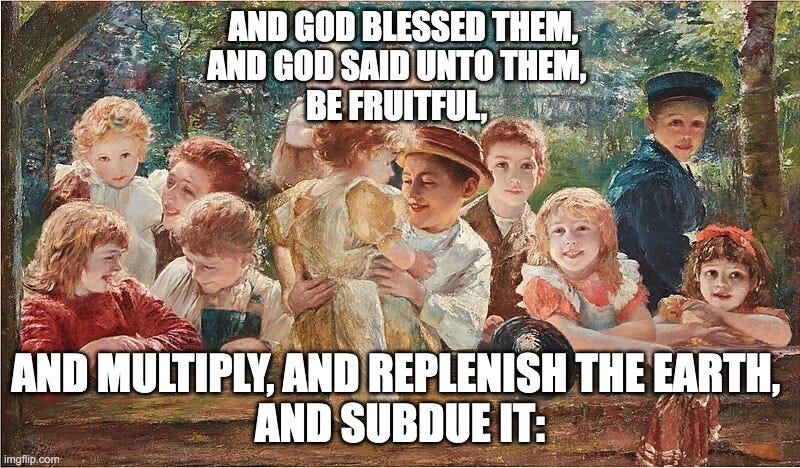Ok, so Don Pato, of Don Pato’s Musings (who wins an award in my book for most creative SubStack title) has suggested that we do an exchange of views on the issue of evolution. He was kind of surprised, or so it seemed, that there was anyone left who didn’t already believe in evolution, and was excited to debate/discuss the issue.
He will not, yet, be posting anything to his stack, since he is having technical difficulties, so I will post his comments here and respond to them.
As always others are welcome to also respond. Really.
Don Pato read my post on Methodological Naturalism, and responded as follows:
Hi. I will be brief. I think methodological naturalism is a bit silly but I understand the intent. I don’t condone it. Keep the overton window maximally open and the truth will reveal itself. However i get we don’t want to go down certain rabbit holes. I believe you are real but you could not be. I can never prove it but we will hopefully both operate as if we are. And if we reach a hurdle where there isn’t sufficient evidence, we will just have out best logic and reasoning to rely on. Nothing is ever truly certain. The Scientific method demands to be challenged, that’s what makes it science. If you start out saying we won’t consider this. You have already lost the plot.
https://substack.com/profile/29487290-don-patos-musings
So I have entitled this post ‘Ground Rules’, cause I think that is the level we are at in the discussion. Indeed I will be surprised if we ever manage to get past there. I think that it is at the ground level that all discussions of creation and evolution should start, and most of them should end, cause there isn’t any real debate left by the time you get past the ground rules.
Let me propose the following ‘ground rules’:
1) Remember methodological naturalism.
Any time someone opens his mouth (or his keyboard) and starts with ‘Science…” they need to stop and say, “Wait. What science? Am I talking about ’scince’ that has been done on the foundation of methodological naturalism? In that case it can have literally nothing to say about the debate.
This is a really hard ground rule, because pretty much everything that an evolutionist will want to bring forward is ruled out; because pretty much everything that an evolutionist thinks of as ‘proof’ is built on the foundation of methodological naturalism.
2) You going to do theology?
Whenever you are faced with the issue of special creation, whenever that is one of the two things that are on offer (the other being materialism), you are tempted to open your mouth and say, “I don’t believe in a god that would…”… ooops. That’s theology. I would love to argue theology with you, but you need to remember that whenever you try to define who God is, or what He would do, you are doing theology. And in theology “I don’t believe in…” is not a valid argument. You need to be able to say, “I can disprove that God would…”. And you will need to do it using theological terms of discussion. Welcome to my world.
3) Adversarial evidence.
In a debate between A and B something can’t be evidence for A (in a discussion between A and B) unless it is evidence against B. IE you must be able to say ‘This could not have arrived via special creation’. Whenever you are arguing against special creation and in favour of evolution, it is not enough to say “This fits evolution.” You must be able to say “And it doesn’t fit Special Creation.” Which means you would have to have a theology of what Special Creation is. (see point 2)
4) Best Hypothesis.
There is a way out of problem (1). Most of the time that evolutionists argue, they tend to try to argue ‘for’ their ideas. They never consider any other ideas, they just try to build support for their own. But you can argue ‘best hypothesis’.You could argue that both evolution and Special Creation are possibilities for how the world came to be, but evolution is the ‘better’ hypothesis.
But in order to do that you need to clearly confront problems (2) and (3) or… accept the work that someone else has done on (2) and (3). You can say, “I think that the evidence fits my theory of evolution better than it fits Von’s theory of special creation. However, unless you are going to do (2) and (3) on your own, that leaves you completely dependent on my defining what my theory is.
And then all of the evidence that you present will have to be evidence that was not derived from people violating (1)… or evidence so self-evident that anyone can see it.
5) Basis for your actions
Remember whenever you act that your actions will be judged in the light of your theory. So if you propose that your reasoning is the mere fruit of accidental chemical firings in your brain… be prepared to have them treated like that.
The Other kind of ground rule
I would also suggest that we be very careful when quoting one another. Using copy/paste and providing a link is the best way to make sure that you are not misquoting the other person. Do your best to promote their best case, and disagree with that.
My Prediction
Here is my prediction: No believer in evolution can get past these ground rules. I base this on two things: my knowledge of evolutionary theory and having participated in dozens of debates and discussions on the subject. Here are some really fun areas that I would love to get into with someone who is willing to argue for evolution:
1) First thing.
The ‘evolution’ of a first life is clearly impossible. So clearly impossible that scientists frequently rely on smoke and mirrors. Let me put it this way: if scientists, in a lab, using massively controlled conditions, cannot artificially produce reproducing life, there is no way that it can arrive accidentally out in the real world.
2) Second things.
Even assuming that the first life did manage to miraculously arrive (and I use that word advisedly) there is no way that it could successfully produce a second life… as in a new species.
3) Sexual reproduction.
I love to talk about marriage and sex and all, and evolution is no different. There is no way to describe a pathway, using incremental changes, from asexual to sexual reproduction. No way at all to even describe a theoretical pathway.
4) Morality.
Our understanding of morality cannot comport with evolution. It might be possible for someone to describe a path by which many of our behaviors could have produces positive effects… but it is not possible to reconcile that with our beliefs about morality. Which is not fatal for evolution, but fatal for the existence of evolutionists as people.
5) Truth:
Our understanding of truth cannot comport with evolution. See (4). Which is fatal not for evolution itself, but for the evolutionist attempting to argue. He should, if he were honest, be forced to say, “The evolutionary pathway which has produced me compels me to say…” and not “I believe this is true.”
We see this issue already arising in our interactions. In response to one of my questions on notes, Don Pato said:
My understanding is yes nothing is intrinsically good. Nature is indifferent and evolution is the play out of nature. I’m not sure I completely understand your question but in as much as I do, this is my answer. Consider when a person gives a homeless person some spare change, we might call this good. But there is a likely evolutionary answer. It made sense when living in groups of 10-70 to share extra food because when you did, you would likely get the same when you were out of food. Us doing it today to people we know we will likely never see again can be viewed as good, or a kind of vestigial misfiring of our old evolved behaviour.
To which I ask, “What are you willing to give up?” What part of your humanity, what part of your ability to communicate with the rest of us, what part of basic logic?
There are two fundamental problems with his answer. They are a little bit contradictory, but let’s work through them:
1) If you understand where something comes from, you understand what makes it up. So if you are proposing that our feelings about morality come from ‘evolution’, we need to understand what that means. Small genetic changes leading to accumulating changes in the way that our brains and chemical systems work, ending up with our current state. Thus when someone feels, say, ‘love’, it means that their brain and their endocrine and other systems are giving off electricity down certain pathways, or sending chemicals into the body.
Now use that in a relationship. “Oh, Don Pato, do you love me?” “Well, yes, actually. It seems to me that the various electrical pathways and chemical reactions do line up with the term entitled ‘love’” You might as well respond, when she asks if she is pretty, that, yes indeed, when you look at her you get a hard on.
There is a fundamental disconnect between the value that others put upon your statements, and the reason that you hold for stating them. (Not the reason you do state them, because you are quite wrong about evolution. We are merely talking about the reason that you, yourself, would give if force dot logically describe the source of your statements.)
There is a famous brother-of-the-groom speech on youtube. In it the brother starts with some incidents from their childhood, where the groom was forced to do something nice to the brother (the one giving the speech) and would say, “Mom made me do it.” And then, at the end of this very nice and very funny speech in which he ends up praising his brother and new sister in law, the brother says, “Mom made me say that.” And sat down. To laughter.
Because we get the point. If his mother truly had made him say all that, then the speech may have represented her values, her opinion, but certainly not his!
2) On the other hand, if you know what causes something, you can judge its value for yourself as well. If you say to yourself, “I understand that my reluctance to torture children comes from my evolutionary background. There is nothing intrinsically wrong with it. So if I can make sure I can get away with it…”. Hopefully, this deliberately hyperbolic issue will bring forward the issue. If my feelings for my own offspring merely come from history, then I can the more easily dismiss them and abandon my wife.
So I would challenge him with this: are you willing to give up your humanity? From time immemorial (as in, the first chapter of Genesis), men have stated, and lived, as if there was something real, something true, something objective… indeed something far deeper and more important than mere physical reality… that was reflected in their feelings and thoughts about love, truth, justice, beauty, family.... That has always been part of who we are as humans. Your beliefs in evolution are wrong, and that can be clearly shown. But they are also deadly. Because if you embrace them, you give up what it means to be human.
Links
Two people with whom I am discussing evolution:
Some posts of mine that are about evolution:
Attacking Evolution #1A
Matthew 1:21-23 And she shall bring forth a son, and thou shalt call his name JESUS: for he shall save his people from their sins. Now all this was done, that it might be fulfilled which was spoken of the Lord by the prophet, saying, Behold, a virgin shall be with child, and shall bring forth a son, and they shall call his name Emmanuel, which being inte…
Reproductive Advantage
I read somewhere, and I have no idea where and I probably wouldn’t link to it if I did know, but you can google it, that some people are claiming that ‘homosexuality’ or, as I put it here, ‘Sodomy’, confers genetic advantage. At first glance, it seems utter nonsense that the practice of Sodomy, which obviously leaves its practitioners with no offspring…
Forcing yourself to Believe
There is a mistake that atheists make when addressing their relationship with Christianity, or God in general. It is a rather large mistake, and may be related to why they are atheists in the first place. It is expressed in several ways, but one of the most dramatic and clear ways comes from
Bibliography
So far I have recommended the book ‘Not by Chance’.

















I think we should post these and let everyone see and carry on for a few days. I have faith we will get somewhere
You are both wrong. 1/2 :-)
That is a sarcastic remark with serious intent. Evolution is real and explains the physical characteristics of life on earth. These physical characteristics are coded for on allels which are sites on dna which we know change over time and we know the history of in some detail.
So evolution is real but explains less than pure materialists think it does. It falls flat in trying to derive an ought from an is and thus is silent on matters such as ethics, beauty, love, and the foundational basis by which one would choose an ontology that allows of Platonic pure forms perhaps even non material conscious beings.
So my prediction is you will talk past each other because both of you have an epistemological bias that structures your view of reality and the words you use to describe that I think it will be hard for you to agree on neutral terms to use in the debate or discussion. I would like to be depressed though and have you two prove me wrong. You are both excellent writers, good luck.